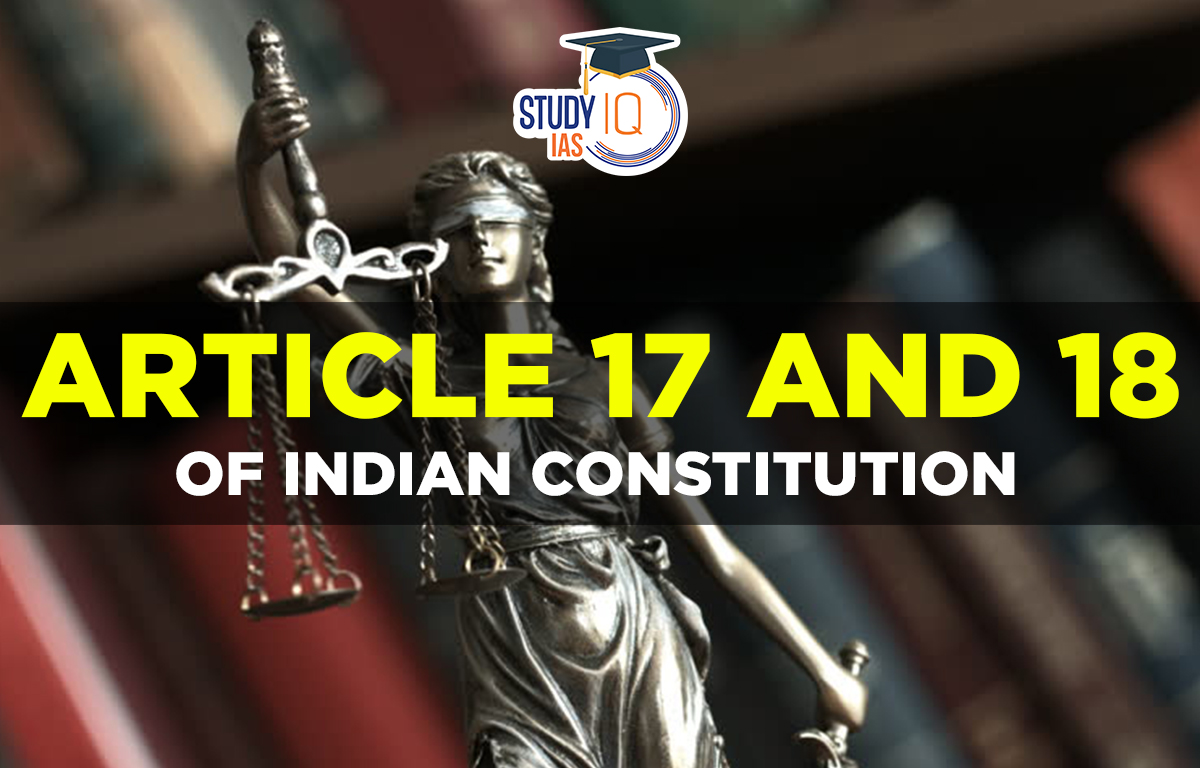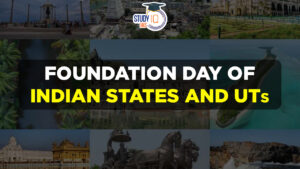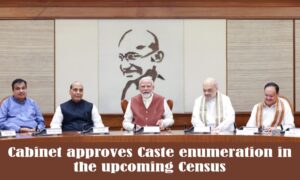Table of Contents
Articles 17 and 18 of Indian Constitution
Article 17 (Abolition of Untouchability) and Article 18 (Abolition of Title), both are covered under Part III (Fundamentals Rights) of the Constitution which ensures an important role in the establishment of equality of status of citizens in India. Articles 17 and 18 of Indian Constitution are a part of the Right to Equality that was included for the Abolition of Untouchability and Title respectively.
Read More: Article 15 of Indian Constitution
Article 17 of Indian Constitution
According to Article 17 of the Indian Constitution, untouchability is no longer permitted. According to the Article, untouchability is against the law in all forms. The practice of untouchability is outlawed by Article 17 of the Indian Constitution.
Untouchability is a prohibited practice, and those who practice it risk legal ramifications, according to the Untouchability Offences Act of 1955 (later renamed the Protection of Civil Rights Act in 1976). All Indian citizens should have access to everything that is available to the general public, per this Act. Untouchability is forbidden by Article 17 and is not permitted in any form. Untouchability-related impairments must be enforced, which is forbidden and punishable by law.
It should be noted that, though Article 17 abolishes untouchability, but the term “Untouchability” hasn’t been defined anywhere in the constitution. Hence, the Mysore High Court gave its interpretation that the subject matter of Article 17 is not untouchable in its literal or grammatical sense but the ‘practice as it had developed historically in the country’.
It speaks about the societal limitations imposed on particular classes of people as a result of their birth into particular castes. As a result, it excludes certain people from participating in social boycotts or from attending religious services, among other things.
Nature of the Article: It should be noted that Article 17 is the only article of absolute nature among all the other rights given in the Constitution. As there are no exceptions given in this article. That is, it is illegal to practice untouchability in any form. Hence, one cannot violate it under any circumstances.
Read More: Article 16 of Indian Constitution
Article 17 of Indian Constitution SC Judgement & Laws
There are some important Supreme Court Judgements and laws related to Article 17 of the Indian Constitution described below
The Protection of Civil Rights Act, 1955
To address untouchability, the Untouchability (Offences) Act was enacted in 1955. This law aimed to punish the practice of untouchability and any related discrimination. Offenders could face imprisonment for one to six months and fines ranging from 100 to 500 rupees.
A key issue was that the Act did not define “untouchability,” which led to the creation of the Committee on Untouchability to suggest improvements. The Act was later amended and renamed the Protection of Civil Rights Act, which defined “civil rights” based on Article 17 of the Constitution. The amendments made offenses non-compoundable to enhance penalties.
In the case of Devrajiah v. B. Padmanna (1957), the Karnataka High Court ruled that since the original Act didn’t define untouchability, it covered all forms, as prohibited by Article 17. Furthermore, the right against untouchability can be enforced not just against the state but also against private individuals, as shown in People’s Union for Democratic Rights v. Union of India (1982).
The Supreme Court highlighted the broader social implications of untouchability in Sabarimala Temple Indian Young Lawyers’ Association v. State of Kerala (2018), indicating that social prejudices, like banning women from entering the temple, also count as untouchability.
Article 17 is crucial for the right to equality in India. The caste system has long caused division, worsened by colonial rule. Many were marginalized, denied access to temples, resources, education, and jobs. Recognizing these injustices, the Constituent Assembly unanimously adopted Article 17 to protect against untouchability.
Read More: Article 14 of Indian Constitution
Article 18 of Indian Constitution
Article 18 of the Constitution states that the government cannot give titles to individuals, except for military or academic honors. This rule applies not just to Indian citizens receiving titles from India, but also to anyone accepting a title from a foreign country while holding a job in India. The debates among the framers of the Constitution showed a strong desire to prevent classifying people by titles. They even mentioned that accepting a title could lead to losing Indian citizenship. Therefore, Article 18 emphasizes the duty to uphold equality among all citizens.
Read More: Salient Features of Constitution of India
Article 18 of Indian Constitution Clauses
The only restriction is that no one will ever use the Padma Shri, Padma Bhushan, Padma Vibhushan, or Bharat Ratna as a prefix or suffix to their names. It also excludes academic and military professions. This article abolishes titles and makes four provisions in that regard.
| Article | Provisions |
| Article 18(1) | It prohibits the state from conferring any title (except military or academic distinction) on anybody, whether a citizen or a foreigner. |
| Article 18(2) | It prohibits an Indian citizen from accepting any title given by any foreign state. |
| Article 18(3) | A foreigner holding any office of profit under the state can accept any title from any other foreign state with the consent of the president of India. |
| Article 18(4) | No citizen or a foreigner holding any office of profit or trust under the State is to accept any present, emolument or office from or under any foreign State without the consent of the president. |
| The addition of clauses (3) and (4) ensures that a non-citizen stays loyal to the government and upholds the trust reposed in him. | |
Read More: Directive Principles of State Policy
Article 18 of Indian Constitution Purpose
Titles can create a sense of superiority and divide people based on rank. To prevent this, the Constituent Assembly decided to include Article 18, which has four parts aimed at promoting equality and unity in society. They believed that allowing titles would harm the peace and democratic ideals of the nation.
Article 18 doesn’t guarantee a fundamental right but restricts the government’s power to issue titles. In a democratic system, titles should not exist, as they can create unfair distinctions among people. Accepting a title is against this principle, but it’s not a crime. Individuals can use Article 226 to challenge the state’s actions and enforce their constitutional rights through a writ of Mandamus.
Read More: Preamble of Indian Constitution
Article 18 of Indian Constitution SC Judgements
Balaji Raghavan v. Union of India (1996)
In this case, two petitions were filed in the Kerala and Madhya Pradesh High Courts to stop the government from awarding titles like Bharat Ratna and Padma Awards, arguing they violated Article 18, which prohibits titles that create social hierarchies. The Supreme Court, dismissed the petitions, stating these awards recognize extraordinary service and do not discriminate based on race, sex, or religion. The court acknowledged that the process for selecting award recipients was not clear and recommended forming a committee to establish proper procedures.
Indira Jaisingh v. Union of India (2017)
This case addressed whether the title “Senior Advocate” is a title under Article 18 that violates the right to equality. Indira Jaisingh, a senior advocate, challenged the rules for designating senior advocates at the Supreme Court. The court reviewed practices from various countries and ruled that being designated as a senior advocate is based on merit, not a title. It established guidelines for this designation, including years of practice, expertise, public service, publications, and suitability based on an interview.
Read More: Articles 12 and 13
Articles 17 and 18 of Indian Constitution UPSC
Contrary to popular belief, the right to equality is not a straightforward idea. The Indian Constitution seeks to create a society in which every person is given equal status in every way. The advancements made in accordance with the Constitution’s right to equality have improved Indian society without any division of Indian society based on class, faith, colour or titles, the Constitution’s founders aspired to create a society in which all citizens are treated equally. The courts have provided numerous interpretations through their rulings in order to accomplish the goal of equality that the Indian Constitution’s authors desired.
Read about: Important Articles of Indian Constitution


 National Security Advisory Board revampe...
National Security Advisory Board revampe...
 Foundation Day of Indian States and UTs,...
Foundation Day of Indian States and UTs,...
 Cabinet Approves Caste Enumeration in th...
Cabinet Approves Caste Enumeration in th...





















